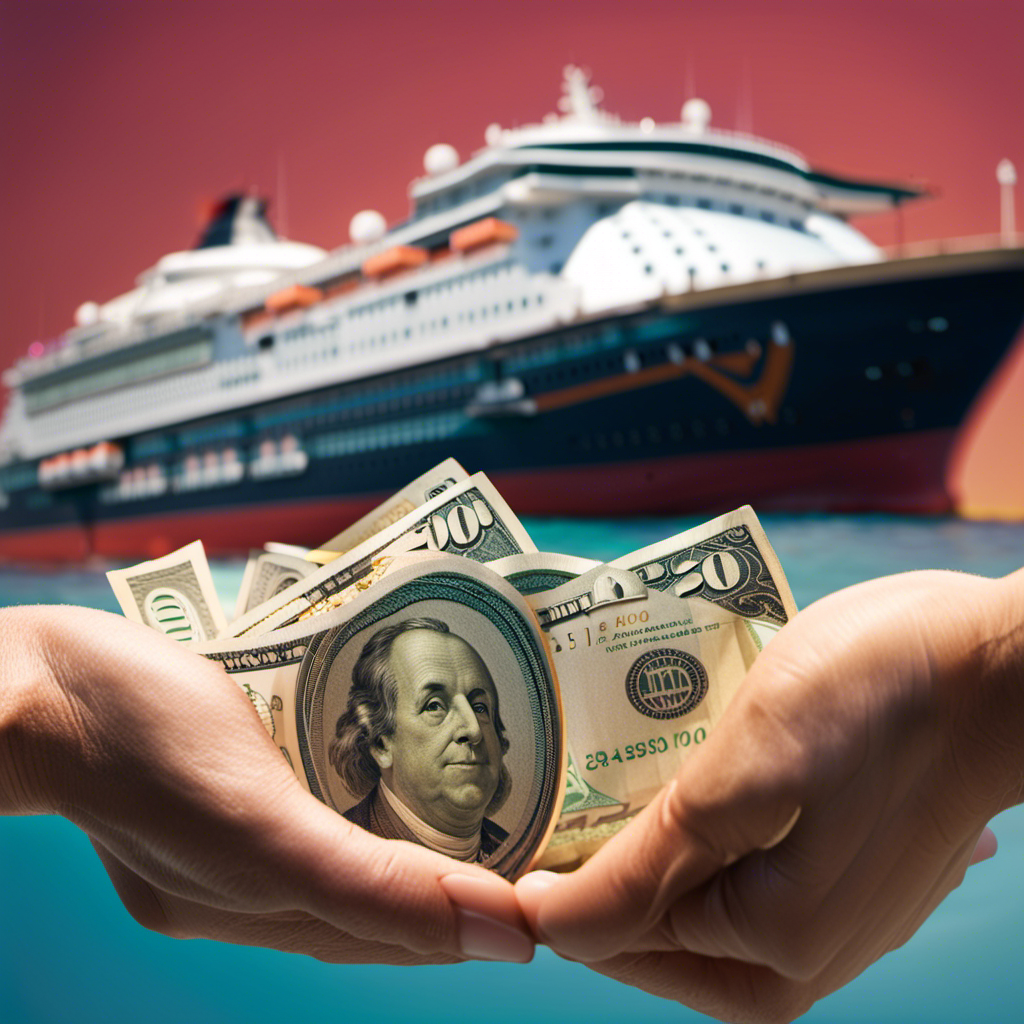Hi there!
So you’re planning a cruise and trying to figure out whether or not to prepay gratuities, huh? Well, I’ve got you covered.
In this article, we’re going to dive into the pros and cons of prepaying cruise gratuities. We’ll talk about why some people love the idea of prepaying, while others aren’t so keen on it.
By the end, you’ll have all the information you need to make an informed decision that’s right for you.
So let’s get started, shall we?
Key Takeaways
- Gratuities on a cruise are charges added to your fare and distributed to staff members.
- Prepaying gratuities simplifies onboard expenses and ensures you won’t have a higher bill to settle on the ship.
- Prepaying locks in the current gratuity rate and avoids potential rate increases in the future.
- Ultimately, whether to prepay or not depends on personal preference and what makes you feel most comfortable.
Understanding the Purpose of Cruise Gratuities
I understand that the purpose of cruise gratuities is to ensure that the staff members, such as room stewards and dining staff, receive their fair share of the charges added to my cruise fare. Including gratuities in the fare has several advantages.
Firstly, it simplifies the payment process, as you don’t have to worry about settling a separate bill for gratuities on the ship. Additionally, it guarantees that the staff will receive their deserved compensation, as the gratuity amount is already accounted for in the fare.
On the other hand, removing gratuities from the fare could have a potential impact on the staff. They rely on these gratuities as a significant part of their income. Without them, their earnings could be significantly reduced, affecting their livelihoods.
It is important to consider the impact on the staff when deciding whether to include gratuities in the fare or not.
Cash Vs. Automatic Gratuity Charges: What Has Changed?
Paying gratuities in cash used to be the norm, but now they are automatically charged to your account. This change has both advantages and disadvantages.
The advantage of automatic gratuity charges is that it simplifies your onboard expenses. You don’t have to worry about carrying cash or calculating the appropriate amount to tip each staff member. Additionally, prepaying gratuities ensures that you won’t have a higher bill to settle on the ship.
However, there are also some drawbacks to this system. Some people may feel uncomfortable paying a tip before receiving the service, as it goes against the traditional practice of tipping based on the quality of service. Prepaying also means giving the cruise line more of your money in advance.
Ultimately, the decision of whether to prepay gratuities or not comes down to personal preference.
How Gratuities Are Allocated to Cruise Ship Staff
Allocating gratuities to cruise ship staff is an important part of ensuring that their hard work and service are recognized and rewarded. When it comes to distributing gratuities, cruise lines have different methods.
Some cruise lines have a set distribution system where gratuities are evenly divided among staff members, while others allow passengers to allocate the gratuity amount to specific individuals.
The impact of gratuities on staff morale is significant. Knowing that their efforts are appreciated and financially acknowledged motivates cruise ship staff to provide exceptional service. It boosts their morale and encourages them to go above and beyond to make guests’ experiences memorable.
Gratuities also serve as an incentive for staff members to continue working in the cruise industry, knowing that their hard work is not only valued but also rewarded.
Gratuities Included or Separate: Know Your Cruise Line’s Policy
Understanding the cruise line’s policy regarding gratuities being included or separate is important before embarking on a cruise. The decision to include gratuities in the fare or charge them separately has its pros and cons. Let’s take a look at both sides:
| Pros of including gratuities in the fare | Cons of including gratuities in the fare |
|---|---|
| Simplicity in onboard expenses | Limited control over tipping |
| No surprise charges at the end of the cruise | Potentially higher upfront cost |
| Locks in the rate and avoids future increases | May feel uncomfortable paying in advance |
| Pros of charging gratuities separately | Cons of charging gratuities separately |
|---|---|
| More control over tipping | Additional charges at the end of the cruise |
| Can adjust gratuities based on service received | Potential rate increases in the future |
| Pay only for the service you received | More financial planning required |
Ultimately, the decision to include gratuities in the fare or charge them separately depends on personal preference. Some may prefer the convenience and peace of mind of prepaying, while others may prefer to have more control over their tipping. It’s essential to consider what makes you feel most comfortable and aligns with your financial planning.
Removing Gratuities: Is It Worth the Implication?
I personally find it important to consider the implications before removing gratuities from my cruise fare. Removing gratuities can have a significant impact on service quality and the overall experience onboard. Here are three things to keep in mind when considering this decision:
-
Service Quality: By removing gratuities, you may inadvertently affect the level of service you receive. Cruise staff relies on these gratuities as a significant portion of their income. Without them, they may be less motivated to provide exceptional service, resulting in a less enjoyable cruise experience.
-
Alternatives to Prepaying: If you’re hesitant about prepaying gratuities, there are alternatives to consider. Some cruise lines allow you to adjust the gratuity amount or remove it entirely if you feel the service has been subpar. It’s always a good idea to address any concerns directly with the cruise line’s guest services.
-
Considering the Overall Cost: While removing gratuities may save you some money upfront, it’s essential to consider the overall cost of your cruise. The impact on service quality and the potential for additional expenses if you decide to tip separately should be factored into your decision.
Ultimately, the decision to remove gratuities should be weighed carefully, taking into account the impact on service quality and considering alternatives to prepaying.
The Mechanics of Prepaying Cruise Gratuities
Paying gratuities in advance simplifies the process and ensures that I won’t have to worry about settling the bill on the ship.
When it comes to prepaying gratuities versus paying onboard, the cost-effectiveness of each option is worth considering. By prepaying, I can lock in the current gratuity rate and avoid potential rate increases in the future. This not only provides peace of mind but also helps me budget my expenses more accurately.
Additionally, prepaying gratuities has an impact on the cruise line’s revenue. By collecting gratuities upfront, the cruise line can better manage their finances and allocate funds to staff members who provide exceptional service.
However, it is important to note that personal preference plays a significant role in deciding whether to prepay or not. Ultimately, the decision should be based on what makes me feel most comfortable.
Set Daily Rates: How Much Should You Expect to Pay?
Now that we understand the mechanics of prepaying gratuities on a cruise, let’s delve into the factors that can affect the daily gratuity rates and how they vary across different cruise lines.
Factors affecting daily gratuity rates:
- Cruise line policies: Each cruise line sets its own daily gratuity rate based on various factors such as industry standards, operating costs, and employee compensation.
- Destination: Gratuity rates may vary depending on the destination of the cruise. For example, gratuities on cruises to more expensive or exotic locations may be higher.
- Length of the cruise: Longer cruises may have higher daily gratuity rates compared to shorter ones.
- Cabin category: Some cruise lines charge higher gratuity rates for passengers staying in suites or higher-end accommodations.
Comparing gratuity rates across different cruise lines:
- It is important to research and compare gratuity rates when choosing a cruise line, as they can vary significantly.
- Look for transparency in how the gratuity charges are calculated and distributed.
- Consider the overall value you receive for the gratuity rate, including service quality, amenities, and customer satisfaction.
- Read reviews and seek recommendations to get a sense of the gratuity experience on different cruise lines.
Prepaying Vs. Paying Onboard: Pros and Cons
Considering the convenience and potential rate increases, prepaying or paying gratuities onboard is a decision that should be based on personal preference. There are advantages and disadvantages to both options that travelers should consider.
Prepaying gratuities simplifies onboard expenses and ensures that you won’t have a higher bill to settle on the ship. It also locks in the rate you’ve already paid, protecting you from potential future increases. On the other hand, some people may feel uncomfortable paying a tip before receiving the service, and prepaying means giving the cruise line more of your money in advance.
Ultimately, the decision should be based on your personal preference. If you value the convenience and peace of mind of having your gratuities taken care of in advance, then prepaying may be the best option for you. However, if you prefer to have your cash on hand and don’t mind settling the bill onboard, then paying gratuities onboard may be more suitable.
Benefits of Prepaying Cruise Gratuities
I find it beneficial to prepay my cruise gratuities because it simplifies my onboard expenses. By prepaying, I can ensure that I won’t have a higher bill to settle on the ship, and it locks in the rate I’ve already paid, even if the cruise line raises gratuity amounts in the future. Prepaying gratuities allows me to have one less cost to worry about during my cruise, and the extra charge is unlikely to make a big financial difference compared to the overall cruise price. However, some people may feel uncomfortable paying a tip before receiving the service, and others prefer to have their cash on hand for as long as possible. Ultimately, the decision to prepay or post pay gratuities comes down to personal preference.
| Benefits of Prepaying Gratuities | Drawbacks of Prepaying Gratuities |
|---|---|
| Simplifies onboard expenses | Uncomfortable paying in advance |
| Avoids potential rate increases | Gives cruise line more money upfront |
| Locks in rate already paid | Can address poor service regardless |
| One less cost to worry about | No difference in service level |
| Unlikely to make big financial difference | Personal preference plays a role |
The impact of prepaying on staff morale is not directly addressed in the table, but it is worth noting that prepaying gratuities does not affect the level of service received. Staff members are still motivated to provide excellent service regardless of whether gratuities are prepaid or postpaid.
Drawbacks of Prepaying Cruise Gratuities
Paying gratuities in advance may make some individuals uncomfortable with the idea of giving a tip before receiving the service. However, it’s important to consider the pros and cons of prepaying gratuities on a cruise.
Here are some points to consider:
-
Pros of Prepaying Gratuities:
- Simplifies onboard expenses and avoids a higher bill to settle on the ship.
- Locks in the current gratuity rate, protecting against future increases.
- The extra charge is unlikely to significantly impact the overall cruise price.
-
Cons of Prepaying Gratuities:
- Some people may feel uneasy about paying a tip before experiencing the service.
- Prepaying means giving the cruise line more money in advance.
- There is no difference in service quality based on prepaying or not.
Ultimately, the decision to prepay gratuities depends on personal preference. It’s important to consider your comfort level and whether the convenience outweighs any potential drawbacks.
Frequently Asked Questions
Can You Choose Which Staff Members Receive Your Gratuities?
Yes, you can choose which staff members receive your gratuities. Simply inform guest services of your preferences. It’s important to handle gratuities for special requests in a considerate and respectful manner.
Are Gratuities Mandatory on All Cruise Lines?
Gratuities on cruise lines can be optional depending on the cruise line. Some include them in the fare, while others charge separately. For large groups, cruise lines may add automatic gratuities.
Are Gratuities Automatically Added for Children and Infants?
Gratuities are generally automatically added for children and infants on cruises. Parents may choose to tip separately if they feel it is necessary. It ultimately depends on personal preference and the level of service received.
Can You Adjust the Daily Gratuity Rate if You Receive Exceptional Service?
Yes, you can adjust the daily gratuity rate if you receive exceptional service. Simply visit Guest Services on the ship to discuss your experience and request a change in the gratuity amount.
Can You Prepay Gratuities for Only Certain Staff Members, Such as the Dining Staff or Room Stewards?
Can I prepay gratuities for specific staff members like dining staff or room stewards? Prepaying gratuities on a cruise typically covers all staff members. However, it’s best to check with the cruise line directly for any specialty services that may have separate gratuity options.










